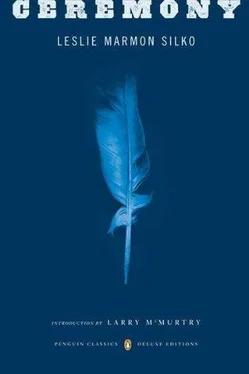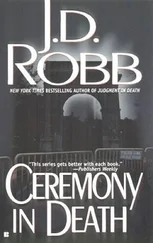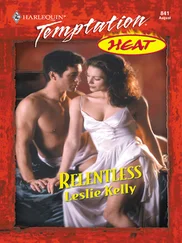He woke up and he was shivering. He stood up and the blanket covering him slid to the ground. He wanted to leave that night to find the cattle; there would be no peace until he did. He looked around for Betonie and his helper. The horses had been tied by a big piñon tree, but they were gone now. He felt the top of his head where the cut had been made; it wasn’t swollen or hot. It didn’t hurt. He stood on the edge of the rimrock and looked down below: the canyons and valleys were thick powdery black; their variations of height and depth were marked by a thinner black color. He remembered the black of the sand paintings on the floor of the hogan; the hills and mountains were the mountains and hills they had painted in sand. He took a deep breath of cold mountain air: there were no boundaries; the world below and the sand paintings inside became the same that night. The mountains from all the directions had been gathered there that night.
He heard someone come up from the west side of the ridge. He turned. Betonie looked even taller in the darkness. He motioned for Tayo to sit down. He sat down next to him and reached into his shirt pocket for the tobacco and wheat papers. He rolled a thin cigarette without looking down at his hands, still gazing up at the east sky. He lit it and took little puffs without inhaling the smoke.
“It all started a long time ago. My grandfather, Descheeny, was an old man then. The hunters were returning from the South Peak. They had been hunting deer and drying the meat for two months. The burros were loaded with sacks full of jerky and bundles of stiff dry hides. The Navajos were careful. They didn’t want any trouble with the soldiers at the fort in San Mateo. They made their night camp up a narrow deep canyon, northwest of the settlement, and they didn’t build any campfires. The night was warm and the sky was bright with stars which flared like fire as they shined. The older men sat wrapped in their blankets, smoking and looking up at the sky to watch for shooting stars. But the young men stood over near the horses, talking in whispers and laughing frequently. They shared a cigarette, and the red light of ash passed back and forth between them in the dark. They didn’t want to sit around all night and listen to the old men belch and pluck out chin whiskers until they were snoring. They wanted to ride over toward the settlement just to see if maybe there wasn’t some stray horse or lost goats wandering in the hills outside town. There had been no raiding for many years, but they could sense the feeling of riding at night through piñon trees, galloping through the cool wind along the flats.
“The old men were unconcerned. They sat whittling tooth-picks from piñon twigs. They knew how it would feel to let the horses run through the cool air; they had been traveling slowly in the dust and sun beside the burros for over a week. They watched the young men untie their horses; someone commented that it was a seductive night, and all the old men laughed and settled back to watch the sky again, and to tell the stories they had for nights like this night.
“The stars gave off a special light, more subtle and luminous than moonlight. The riders could make out the density of the trees and the massive boundaries of the boulders, but were still protected by darkness. When they got close enough that they could smell wood smoke, they pulled the running horses down to a lope and then a trot. The horses were excited and hot; they shook their heads and tried to pull away the reins. The riders could feel their heat and smell the horse sweat. They looked east at the tiny square pattern of the town in the valley that came down from the west slope of the big blue peaks, still solid with snow. They could see a few dim outlines of windows. They rode slowly, listening and watching. They did not expect to find anything, because they knew how careful the Mexicans were with their livestock at night. They were satisfied to ride close enough to smell the wood smoke and hear the village dogs barking in the distance.
“They had turned the horses around, and were riding back to the camp, along a piñon ridge. They had crossed a grassy clearing and were riding into the trees again when their horses stopped suddenly and spun around in panic. It was something about the big piñon tree at the edge of the clearing; the horses shied away from it and blew air through their nostrils when the men tried to ride them near it. They would have left that place, galloping fast, if one of them had not seen a light-colored object fall out of the tree, lightly like a bird. He dismounted and walked over to the tree slowly and picked up the object. It was a blue lace shawl. The others walked over, and they stood together and looked up into the branches of the big tree.
“They boosted a man up to the big branch to bring her down. He moved toward her cautiously, expecting her to fight, but she came down on her own, dropping softly into the dry needles under the tree. She did not cry like captives did, or jabber in her own language with tears running down her face. She held her mouth tight, teeth clenched under her thin lips, and she stared at them with hazel green eyes that had a peculiar night shine of a wolf or bobcat. The wind came out of the trees and blew her loose hair wildly around her wide brown face. Their confidence was caught in the wind; they were chilled as they looked at her. Each man was ready to let her go, to leave that place as fast as possible, but no one wanted to be the one to admit his fear. After all she was only twelve or thirteen, and she would bring a good price.
“They tied her to a small tree in a clearing where they could see her. But she watched them all night, staring at them steadily until they were afraid to look at her. In the morning the old men were silent. They did not joke or laugh as they loaded the burros. They gave her a horse to ride, and doubled up themselves; none of them wanted to get near her. Late in the afternoon they stopped to rest the animals in a canyon surrounded by red-rock mesas. The old men discussed how to get rid of her; nobody said so, but they all knew that they could not simply turn her loose or leave her behind, tied to a tree. They were in trouble now. They would kill her as soon as they found somebody who knew how it should be done. The old men discussed the stupidity of the young men in tones of great contempt. ‘It’s a good thing for us we are near old Descheeny’s place,’ one of them said, ‘we can get him to help us.’
“Early the next morning they rode into the Chuska Mountains. They stopped at the white clay springs and sent someone up the hill to find Descheeny. They looked at the Mexican captive and then at the burros loaded with meat; they wondered how much Descheeny would charge to get them out of this situation. Descheeny’s wives came down the hill first; they watched curiously, and then walked back up the trail.
“‘What does she look like?’ he asked his wives before they could speak. ‘Who?’ they said, pretending not to understand him, the way they often did, trying to anger him. But he smiled this time, and got up from his place by the door. ‘Don’t give me any trouble, ladies,’ he said, putting on his old badger fur hat, and reaching for his walking cane, ‘or I think I will marry her.’
Descheeny stood on the trail above the spring and watched her. She was kneeling at the edge of the pool, washing herself. Descheeny came down to the hunters who pretended to be adjusting the harnesses and tightening the cinches.
“‘Nice load of meat you have there,’ he said, motioning toward the bundles with his chin.
“‘We have something else too, you might have noticed,’ the tall man said casually. ‘She’s quite valuable, but she slows us down. You know how they are. Crying and screaming.’ Descheeny smiled at the lies. He shook his head. ‘I can see what you have. I will help you out for two or three loads of meat. Otherwise. .’ His voice trailed off and the hunters started whispering among themselves.
Читать дальше












